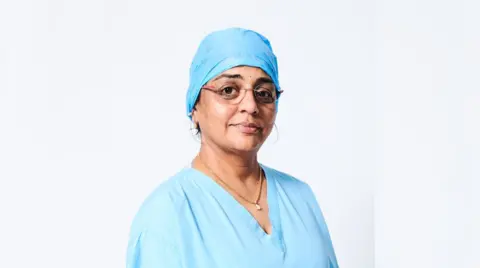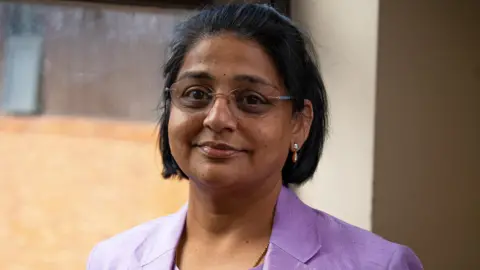'I've wanted to be a heart surgeon since I was 7'
 Tom Jackson/Fremantle
Tom Jackson/FremantleIndu Deglurkar knew she wanted to be a heart surgeon when she was seven years old.
She is now internationally-renowned, working between 85 and 120 hours a week, and while her intricate open-heart surgeries usually happen behind closed doors, cameras have now been invited in.
Prof Deglurkar said the longest she has spent in the operating theatre was 37 hours with an "extremely unusual" case.
The life-saving work of surgeons is being revealed in series two of Saving Lives in Cardiff.
Prof Deglurkar told BBC Radio Wales' Behnaz Akhgar the origin of her career choice as a child was "a bit freaky".
After seeing a magazine with pictures of heart-lung machines she remembers "distinctly, as if it were yesterday, poking my dad and saying 'what are these people doing'?"
After he explained the doctors were performing open-heart surgery, she "knew that was exactly what I wanted to be doing the rest of my life".
 Cardiff and Vale Health Board
Cardiff and Vale Health BoardProf Deglurkar first qualified from Gandhi Medical College in 1991 before she trained in cardio-thoracic surgery in Cambridge, Cardiff and Swansea, followed by Cleveland Clinic in the United States.
Until 2014, Prof Deglurkar was one of only five female consultant cardiac surgeons in the UK.
The ratio of male to female consultant surgeons in the UK is now about 8:1 with female cardiothoracic surgeons constituting less than 10% of the workforce, according to the Society for Cardiothoracic Surgery in Great Britain and Ireland.
Prof Deglurkar performed the first thoraflex hybrid aortic arch aneurysm surgery in Wales.
The new series of Saving Lives in Cardiff features different surgeons as they operate.
In episode one Prof Deglurkar is seen operating on a 51-year-old martial arts competitor who is shocked to learn he needs open-heart surgery.
She said this surgery was complicated because he also "ends up having an aneurysm of his aorta which is a bulge of the main blood vessel which comes out of the pumping chamber of his heart".
She added: "He had no idea that there was anything so serious going on with his heart.
"This is generally the case with most young patients who develop or have leaky valves... it's not at all rare but it comes as a big shock to the patient."
Prof Deglurkar said operating theatres were usually full of people so she hardly noticed the cameras, with the only difference being the lack of music as Abba, Mozart or The Carpenters punctuate the surgery.
"Celine Dion's My Heart Will Go On has a way of popping up when we're coming off the heart-lung machine," she said.
The team are highly trained so complex surgeries become "almost a reflex procedure because we're doing it all the time" with "very rare and extremely complex cases" requiring them to repeatedly go through scenarios.
The longest Prof Deglurkar has spent in the operating theatre is 37 hours, leaving only once for three minutes to have a drink.
She said this was an "extremely unusual" case where the 39-year-old patient had had a tear in his aorta - a major blood vessel in the heart - and was operated on but then had to return because the hole graft had become infected.
"We just didn't give up."
Additional reporting by Behnaz Akhgar
